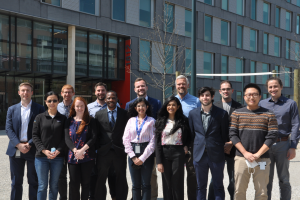
Dozens of startups have called FastForward’s innovation hub in the 1812 Ashland building home since it opened five years ago. Now, one of the original tenants will be moving out for a good reason.
Avidea Technologies, which develops T cell immunotherapies to treat cancer and autoimmune diseases, was acquired by Vaccitech, a British drug and vaccine maker, in December 2021 for $40 million. The deal was the culmination of a lifetime of research and more recent entrepreneurial efforts by Geoffrey Lynn, Avidea’s co-founder and CEO, who attended the Johns Hopkins University School of Medicine.
“Avidea was really the vehicle for our team to advance promising therapies to patients,” he says. “From our earliest days, we always kept an open mind about how to achieve this and how we would eventually exit the company.”
Brian Stansky, senior director of FastForward, who has been working with Avidea and Lynn for five years, said the company has two of the critical elements needed for startup success: adept leadership and strong science.
“From my first meetings with Geoff, it was very clear that he was very committed and determined,” he says. “No startup path is linear, and Geoff has been creative and opportunistic in his approach to advancing the science, building the team and raising funds.”
Avidea specializes in developing polymer-drug conjugates (PDCs), a form of nanotechnology that controls the delivery and rate of release of drug molecules to different tissues in the body. Lynn first became interested in nanotechnology and health care in high school, and did undergraduate research in the field through the National Science Foundation. Lynn then enrolled in a joint M.D./Ph.D. training program in 2008 at the Johns Hopkins University School of Medicine.
After his first two years of medical training at Johns Hopkins, Lynn went overseas to the University of Oxford in England to obtain his Ph.D. in biomedical engineering. He was part of a team at Oxford and the U.S. National Institutes of Health Vaccine Research Center that made discoveries showing the promise of PDC technologies for vaccines and immunotherapies that use T cells to combat cancer and infections.
Lynn returned from Oxford in 2015 planning to resume his medical school studies. Around that time, the U.S. Food and Drug Administration approved checkpoint inhibitors, an immunotherapy that allows T cells to do their work and has been shown to improve survival of patients with certain advanced cancers. Investors and biotech companies began turning their attention to the checkpoint inhibitors and other immunotherapies that leverage T cells to fight cancer.
“There was a market demand for the kind of technology I helped create, which solved the need for generating T cells for various applications,” says Lynn.
So, with “conviction in our science,” Lynn put medical school on hold and co-founded Avidea.
“Before Avidea, I never had the goal of forming a company,” he says. “But we quickly realized that forming a company or finding commercial partners were our only options for translating our discoveries to products.”
After launching Avidea in 2016, the new company had problems finding affordable lab space that also had the necessary equipment.
“We really struggled to make meaningful progress that first year,” Lynn says.
But in March 2017, Avidea signed a lease for a lab in the new FastForward space on Johns Hopkins’ East Baltimore medical campus. Becoming part of FastForward also gave Avidea access to facilities across Johns Hopkins, including key instruments necessary for research and development, Lynn says.
“Having access to these resources was critical because it reduced our costs for launching the company and allowed us to devote more time and resources to key studies rather than needing to invest in infrastructure,” says Lynn.
Avidea ultimately leased multiple offices and labs at FastForward, which also connected the startup with legal and accounting services and potential funding sources. Lynn enjoyed the energy and atmosphere created by startups working out of FastForward.
“The conference room walls are floor-to-ceiling whiteboards where you can sketch your ideas without inhibition. You combine this with the unlimited coffee and the buzz of young entrepreneurs trying to turn their visions into a reality and you have chemistry for a fun and exciting environment for early-stage companies,” he says. “It’s also a space that’s helpful for recruiting talent and for being taken seriously when investors and potential partners visit.”
By early 2021, Avidea had 15 full-time employees, developed a PDC technology platform called SNAPvax and was working on other platform technologies that leveraged T cells. Lynn saw two paths for Avidea: Raise additional funding and continue to grow, or consider a merger or acquisition. As Lynn looked into funding opportunities, Avidea and Vaccitech, which also has roots at Oxford, produced data showing their technologies worked better together than individually to treat cancer. The companies decided to examine what else they could do as a team, Lynn says.
“As we began to take a deeper look, it became clear that our teams and technologies were complementary, which ultimately made it an obvious choice for both companies to decide to merge,” says Lynn, now senior vice president for synthetic immunotherapies at Vaccitech.
Avidea will remain at FastForward at least through the spring as the Vaccitech deal is finalized.
“The Vaccitech acquisition validates both the strength of Avidea’s science as well as the multiple potential applications,” says Stansky. “The transaction is a great next step for Geoff and the Avidea team, and I look forward to watching their progress.”
Though 90% of startups fail, Lynn says he always believed Avidea could beat the odds.
“Having absolute conviction in what we were doing and that we could succeed was the only way I could sell our vision to investors and other stakeholders,” he says. “There were certainly high and low points with the company, times when we needed to pivot, but we always built contingencies for ourselves, keeping multiple doors open to mitigate risk.”